
I’ve never been a huge fan of Halloween or purposefully subjecting myself to ghostly fear, but today is October 31, so I thought it would only be appropriate if we spoke about what constitutes the ghoulish musical canon, why it is different than the Christmas carols that flood our airwaves at the end of each year, and how it might be growing more popular than ever before. As always, this newsletter is also available as a podcast. Listen on Spotify and Apple Podcasts or click play at the top of this page.
We’ll Have Halloween on Christmas
By Chris Dalla Riva
If music and movies were to get a divorce, I don’t think it would be that contentious where the kids spend the holidays. The movies, with a century of political biopics, could have Presidents’ Day. Music, work songs in tote, could take Labor Day. Sure, Christmas might cause some bickering. Both the music and movie industries have their share of holiday classics, but I think music would win out here. Holiday songs are ubiquitous from the church to the toy store each December. Halloween, by contrast, would have to be ceded to Hollywood.
Ask ten people to name a Halloween movie, and you’d probably get ten different answers. Ask those same people for a Halloween song, and at least nine would be sure to say the “Monster Mash”. Hollywood simply has horror on lock. That hasn’t stopped streaming services from offering a slate of spooky songs each October, though.
Spotify has 32 playlists tagged under their Halloween category. Haunted House. Classical Halloween. Folk Frights. Halloween Party. And a bunch of other stuff. Of course, you will find genuine Halloween classics on these playlists, like “Thriller” and “Ghostbusters”. That said, most of the rest of the playlist is just filled with stuff that is either vaguely grim — like “bad guy” by Billie Eilish and “Disturbia” by Rihanna — or has a mention of anything remotely related to Halloween, like “She Wolf” by Shakira and “I Want Candy” by Bow Wow Wow. From those examples, you might notice something else: Halloween music is a relatively recent phenomenon.
This is very different from Christmas music. If we compare the decade each song on Spotify’s Halloween Party and Christmas Hits playlists were composed, you’ll see that the musical traditions of each holiday are very different. According to Christmas Hits, 78% of well-known Christmas songs were composed before 1990. By contrast, only 35% of the songs on Halloween Party were written before 1990. In addition, most of those older songs were not written for the October holiday and are only being associated with the holiday because there aren’t as many options. Things may be changing, though.
Halloween has a long, complicated history that largely falls outside the scope of this newsletter. What does fall within the scope is that the nature of the holiday is evolving and it’s affecting the music we associate with it. First, adults are more interested in the holiday. According to a report by CNN, about 52% of adults said they celebrated Halloween in 2005. In 2012, that percentage had jumped to around 72%. Over a decade later, the New York Times related that that percentage has slowly crept up closer to 75%.
This adult interest on Halloween has led to more adults making music specifically for October 31. LVCRFT, a collective led by Evan Bogart, has been making Halloween-centric albums each year since 2019. One of their songs “Straight To Hell”, which was featured in the Netflix show Chilling Adventures of Sabrina, has racked up almost 10 million streams on Spotify. Over Instagram direct message, Bogart told me that that this change was due to “spooky culture growing so massively throughout all … formats of media.” He continued, “[I]t’s influenced an entire generation of music creators and has seeped into their creative sensibilities.”
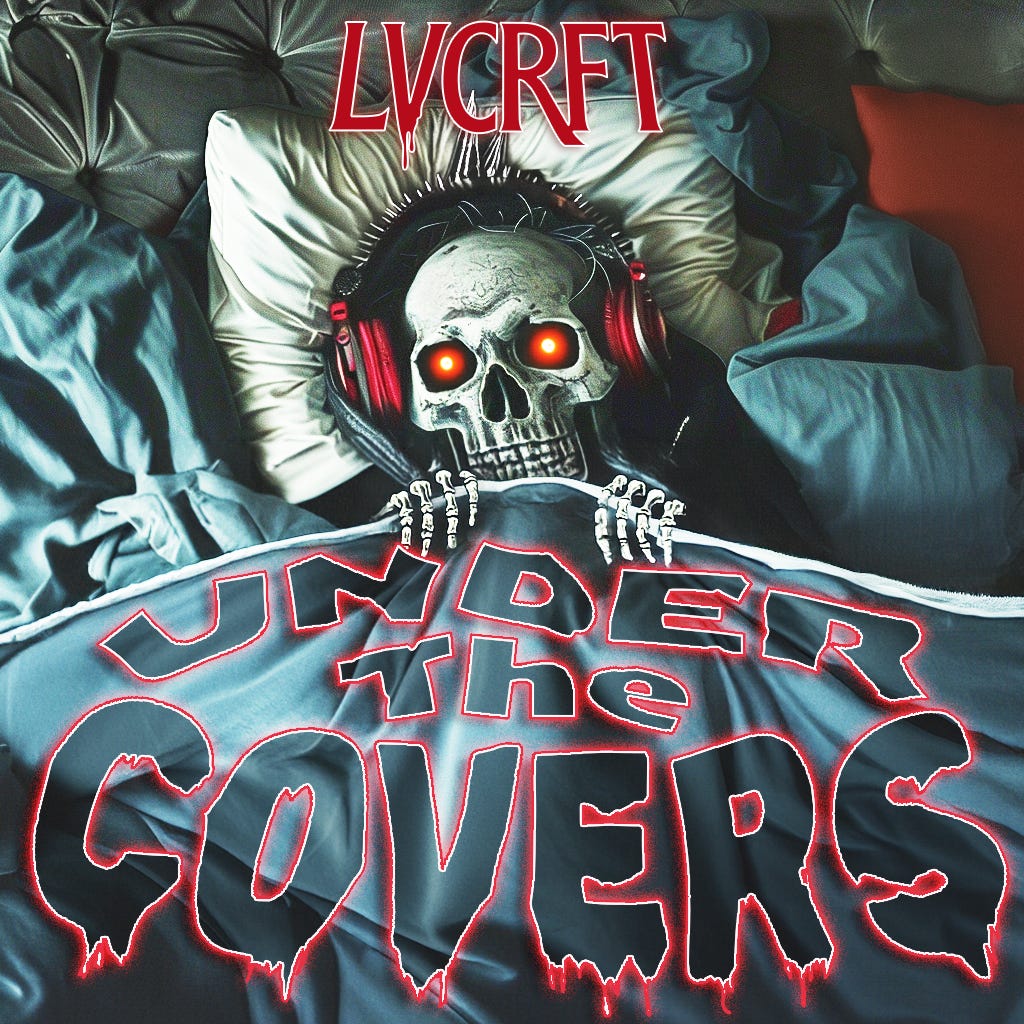
And he is correct. Bogart cited Billie Eilish’s debut album as an example of the spooky going mainstream, but we can see this through the output of other artists too. In 2023, Duran Duran released DANSE MACABRE, an entire album of Halloween songs. The New York Times also detailed how Ashnikko’s 2018 EP Halloweenie has generated over 100 million streams since its release.
This adult passion for all things ghastly and grisly has led to something else that has gotten the music industry excited: spending. According to the National Retail Federation, spending on Halloween has grown from $3.3 billion to $11.6 billion between 2003 and 2024. Where there is money being spent, there are music executives somewhere trying to figure out how they can get some of the spoils.
In a recent article in the New York Times, George Howard of the Berklee College of Music estimated “that revenue from Halloween music is about one-third to one-sixth of the number for Christmas music.” Given that Christmas music generates hundreds of millions of dollars each year, even a fraction of that could get the music industry excited. Plus, the industry already has some blueprints for how this can work, namely the “Monster Mash” and “Spooky, Scary Skeletons”.
“Monster Mash”: Recorded by the appropriately-named Bobby "Boris" Pickett and the Crypt-Kickers, Billboard estimated that between streaming, sync, and publishing revenues, “combined revenue for the song could easily hit $1 million each year.” That’s not the $8.5 million that “All I Want for Christmas is You” is bringing in each holiday season, but it’s a good chunk of change.
“Spooky, Scary Skeletons”: In 1996, singer-songwriter Andrew Gold recorded the album Halloween Howls because “it’s very hard to find any tapes or CDs of Halloween music.” Though it wasn’t an immediate hit, Gold’s whimsical tune ended up going Gold in 2023 when it began to inspire trends on TikTok and YouTube.
 Tiktok failed to load.
Tiktok failed to load.Enable 3rd party cookies or use another browser
Together these two songs suggest that there is likely a bigger market for Halloween-related music than you might think and that music in that universe can work quite well in the digital age. As long as people over the age of 25 don’t suddenly lose their appetite for spooky tunes, I think we will see more interest in the space in the coming decade. Should the music industry conquer Halloween as they’ve done with Christmas, I think they should start setting their sights on other holidays. Be careful, Arbor Day. You might be next.
A New One
"Somebody’s Watching Me" by LVCRFT & Sara Barrios
2024 - Spooky Rock
The scope of Motown’s influence is hard to fathom. Of course, they created pop music in the 1960s that is as close to scientific perfection as music can be and later spawned the career of Michael Jackson, but some of the influence is a bit quieter. Take Kennedy William Gordy as an example. Best known for his 1984 hit “Somebody’s Watching Me” under the name Rockwell, Kennedy is one of Motown founder Berry Gordy’s eight children. He’s also a half sibling of Redfoo, a member of the absurd 2000s duo LMFAO that took over the pop charts with “Party Rock Anthem” and “Sexy and I Know It”. In other words, we have Motown to thank for those silly songs.
As noted, “Somebody’s Watching Me” is also part of Motown’s lineage, but it wasn’t originally released as a Halloween song. In fact, it came out in December. But in the decades since, the song has become an adopted son of the October holiday. Naturally, the aforementioned LVCRFT decided to interpret it on their most recent album. Whereas Rockwell’s version is characterized by paranoia, LVCRFT takes that feeling and blankets it in a sea of eeriness that almost begs to be used in a movie trailer.
An Old One
"Black Sabbath" by Black Sabbath
1970 - Doom Metal
I can recall many songs that have spooked me the first time that I heard them. “Eleanor Rigby” by The Beatles. “Frankie Teardrop” by Suicide. “Psycho” by Jack Kittel. “Kim” by Eminem. And while I find those songs frightening enough that I still won’t listen to them that often, I don’t think any song has ever conjured horror more completely than Black Sabbath’s self-titled song. 54 years later, the song still broods in a way that makes my skin crawl.
Shout out to the paid subscribers who allow this newsletter to exist. Along with getting access to our entire archive, subscribers unlock biweekly interviews with people driving the music industry, monthly round-ups of the most important stories in music, and priority when submitting questions for our mailbag. Consider becoming a paid subscriber today!
Recent Paid Subscriber Interviews: Pitchfork’s Editor-in-Chief • Microphone Engineer • Spotify’s Former Data Guru • American Idol Contestant • John Legend Collaborator • Wedding DJ • What It’s Like to Go Viral • Adele Collaborator
Recent Newsletters: Personalized Lies • I Miss You, Buddy Holly • Blockbuster Nostalgia • Pop Songs & Baby Names • Recorded Music is a Hoax • A Frank Sinatra Mystery • The Evolution of Music Criticism
Want to hear the music that I make? Check out my latest single “Overloving” wherever you stream music.


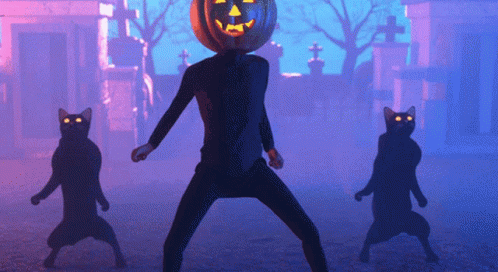


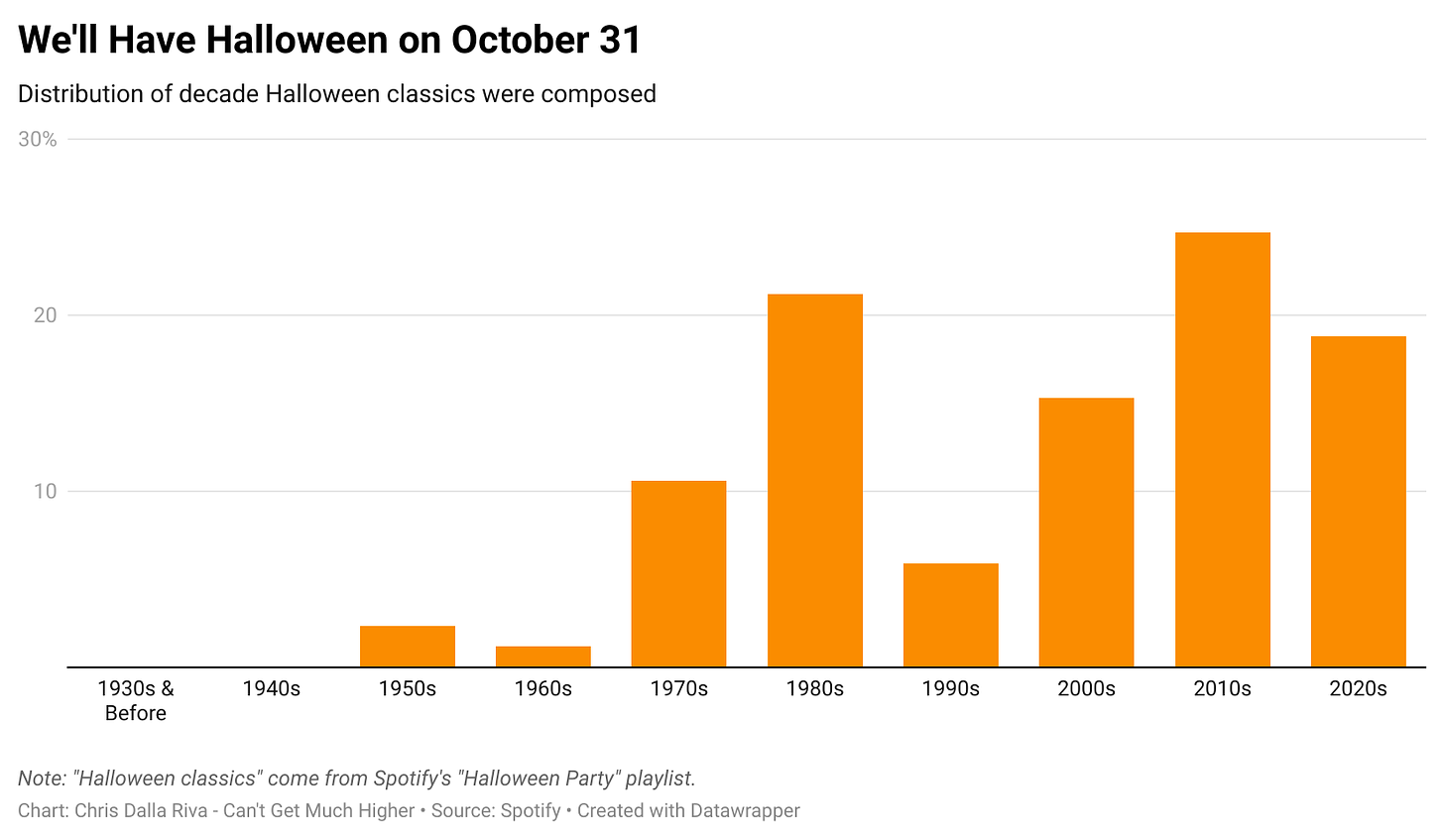
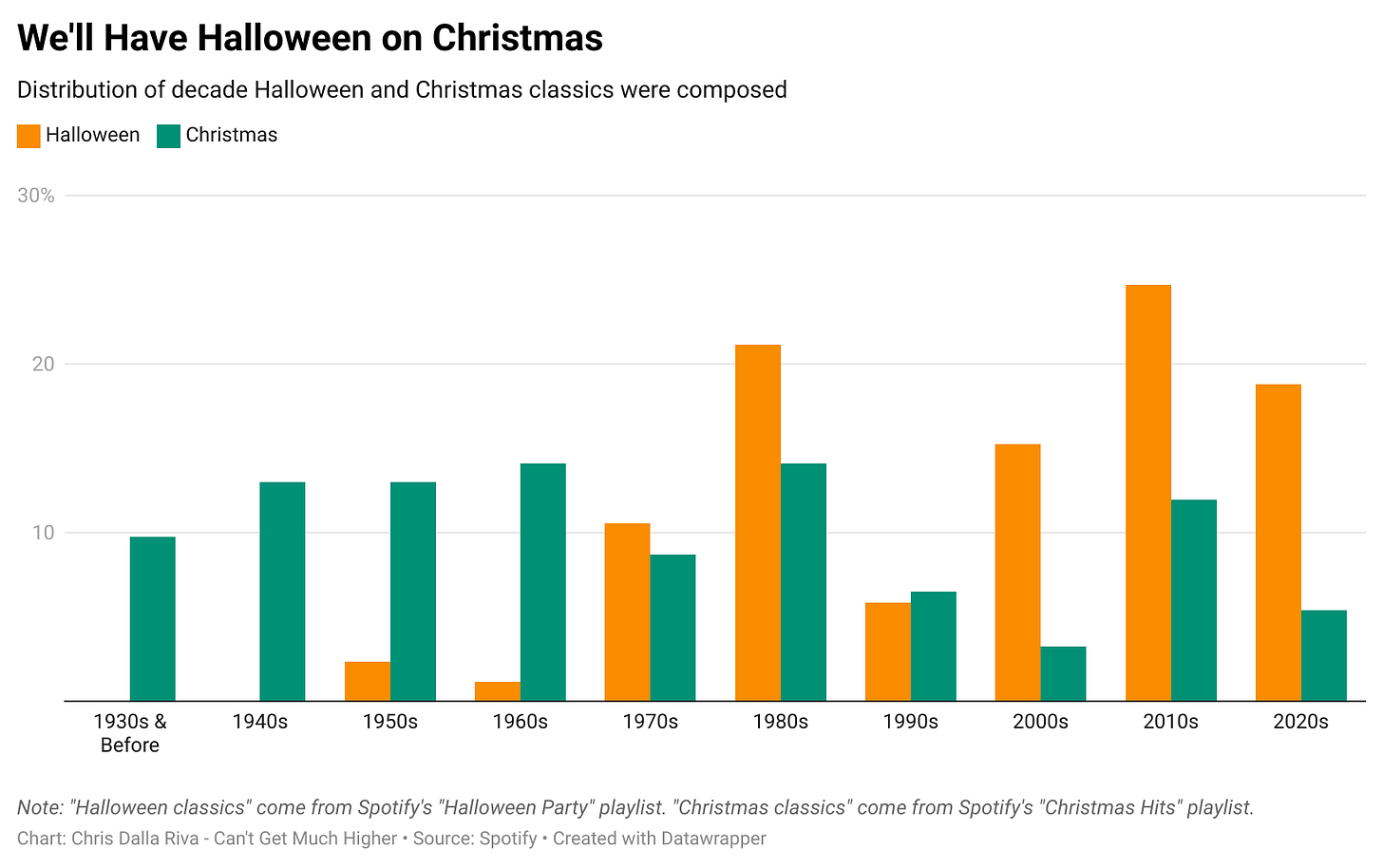
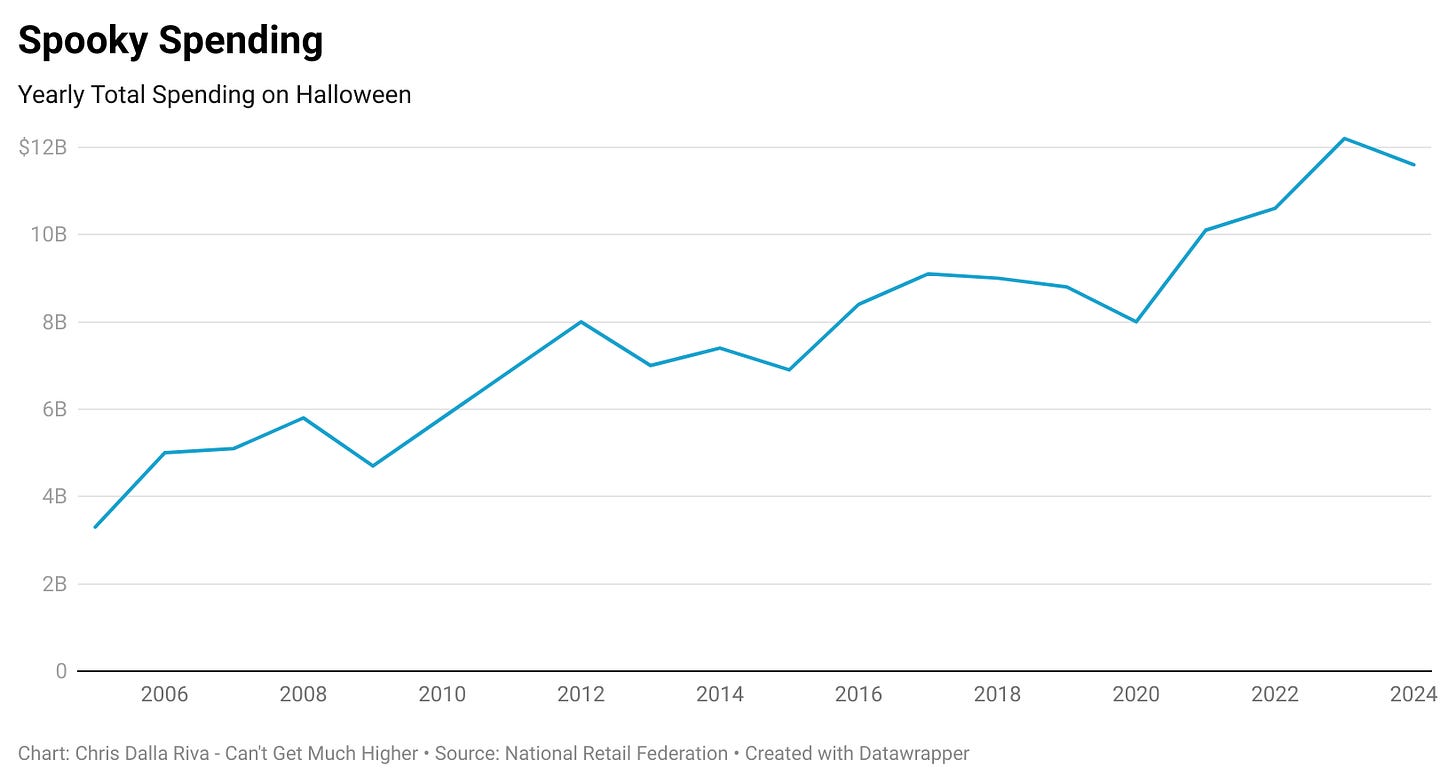
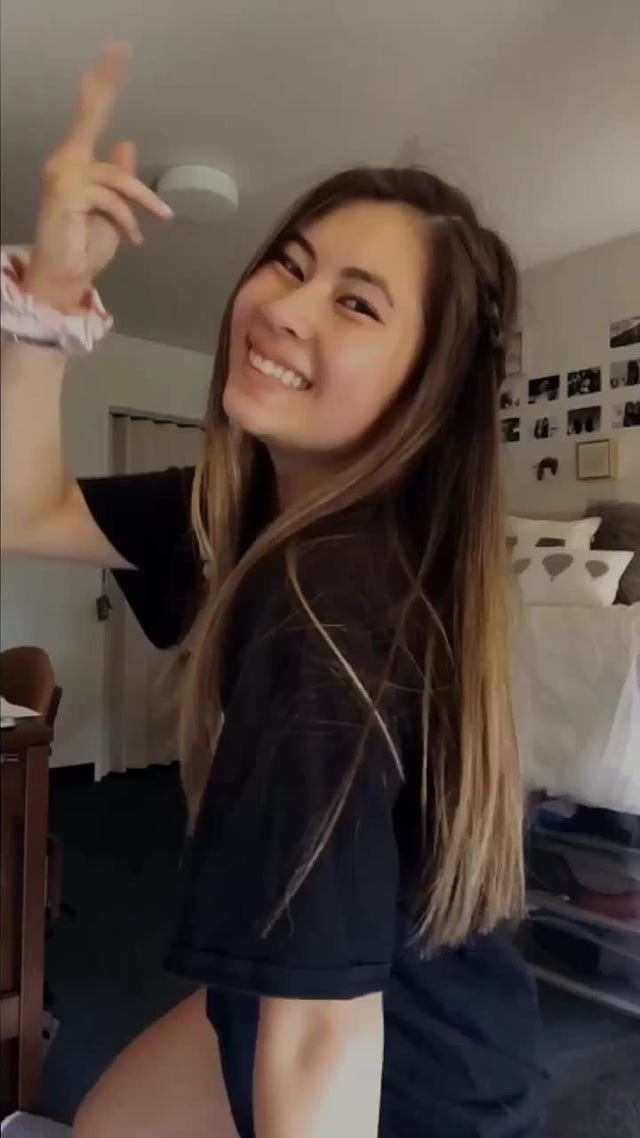





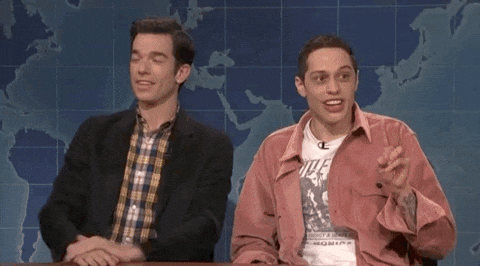

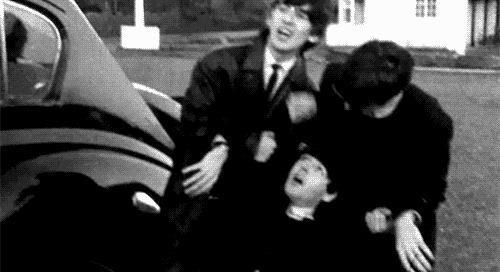




I assume you know the old joke that
Dec(imal)31 = Oct(al)25
which means you can't really separate Halloween and Christmas!
Interesting read! I've been thinking the same thing! We should have an entire season of Halloween themed music like we do at Christmas (although here in Chicago one of our local radio stations starts their Christmas music season tomorrow :(